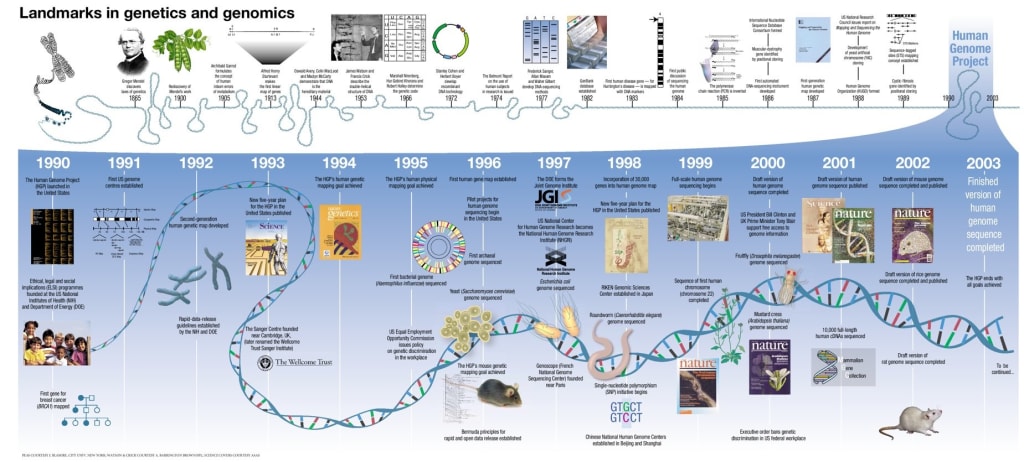Decoding the Future: Exploring the Revolutionary World of Genomics
Unveiling the Genomic Frontier: From DNA Sequencing to Personalized Medicine

Exordium..
The field of genomics has undergone remarkable advancements in recent years, revolutionizing our understanding of the human genome and opening doors to new possibilities in medicine, agriculture, and beyond. From the Human Genome Project to next-generation sequencing technologies, genomics has paved the way for groundbreaking discoveries and transformative applications. In this blog post, we will delve into the fascinating world of genomics, exploring its principles, applications, challenges, and the potential impact it holds for the future.
Understanding Genomics:
At its core, genomics is the study of an organism's entire genetic material, including the genes and non-coding regions of DNA. It involves the analysis of the structure, function, and organization of genomes. Genomes are composed of DNA, which contains the instructions for building and maintaining an organism.
The Human Genome Project, completed in 2003, marked a significant milestone in genomics by successfully sequencing the entire human genome. It provided a foundation for the development of new tools and technologies that have revolutionized the field.
Technological Advancements:
Advancements in sequencing technologies have played a pivotal role in the rapid progress of genomics. Next-generation sequencing (NGS) techniques, such as Illumina's sequencing platforms, have dramatically reduced the cost and time required for sequencing DNA. These techniques enable the simultaneous sequencing of millions of DNA fragments, making it possible to analyze entire genomes and study genetic variations on a large scale.
Additionally, emerging technologies like nanopore sequencing offer promising alternatives to traditional NGS methods. Nanopore sequencing utilizes nanopores embedded in a membrane to directly measure changes in electrical current as DNA passes through the pore. This approach allows for real-time sequencing, simplifies sample preparation, and has the potential to sequence long fragments of DNA.
Applications of Genomics:
1. Precision Medicine: Genomics has revolutionized the field of medicine, particularly in the realm of personalized or precision medicine. By analyzing an individual's genome, healthcare professionals can gain insights into their genetic predispositions to diseases, determine the most effective treatment strategies, and identify potential drug targets. Genomic information can help predict an individual's response to specific medications, enabling tailored therapies for improved patient outcomes.
2. Disease Research and Diagnosis: Genomic studies have provided invaluable insights into the genetic basis of various diseases. Researchers can identify disease-causing genes and genetic variations associated with complex disorders, such as cancer, cardiovascular diseases, and neurological conditions. This knowledge is instrumental in developing targeted therapies, improving disease diagnosis, and enhancing risk prediction for early intervention.
3. Agriculture and Food Security: Genomics has the potential to revolutionize agriculture by enabling the development of crops with improved yield, disease resistance, and nutritional content. Through genomic selection, breeders can identify and select plants or animals with desirable traits, accelerating the breeding process. This approach has the potential to enhance food security, reduce environmental impact, and mitigate the effects of climate change on agriculture.
4. Conservation and Biodiversity: Genomic technologies contribute to conservation efforts by providing insights into the genetic diversity of endangered species and populations. By understanding the genetic makeup of different populations, conservationists can make informed decisions regarding breeding programs, habitat management, and conservation strategies.
Challenges in Genomics:
1. Data Management and Analysis: The vast amount of data generated by genomic studies presents significant challenges in terms of storage, management, and analysis. The analysis of genomic data requires sophisticated computational tools and expertise to process and interpret the vast amount of genetic information accurately.
2. Ethical Considerations: The increased accessibility of genomic information raises important ethical considerations, including privacy concerns, data sharing, and potential discrimination based on genetic predispositions. Striking a balance between maximizing the benefits of genomics while ensuring patient privacy and safeguarding against misuse of
genetic information is a critical challenge.
3. Translation into Clinical Practice: While genomics holds immense potential for improving healthcare outcomes, translating genomic discoveries into routine clinical practice remains a challenge. Integrating genomics into healthcare systems requires addressing barriers such as limited access to genomic testing, insufficient training of healthcare professionals, and establishing guidelines for interpreting and communicating genetic information effectively.
The Future of Genomics:
As genomics continues to advance, we can anticipate several exciting developments:
1. Advances in Therapeutics: Genomic research will pave the way for the development of novel therapeutics, including gene therapies and precision drugs tailored to an individual's genetic makeup. Targeted therapies that take into account an individual's genetic variations and disease mechanisms hold great promise for improved treatment outcomes and reduced side effects.
2. Personalized Nutrition: Genomic information can provide insights into an individual's nutritional requirements and potential food sensitivities. Personalized nutrition plans based on genomic data may help optimize health, prevent chronic diseases, and enhance overall well-being.
3. Synthetic Biology and Biotechnology: Genomic insights are driving the development of synthetic biology and biotechnology applications. Synthetic biology aims to design and engineer novel biological systems for various applications, including the production of biofuels, biodegradable materials, and pharmaceuticals.
Retrospect...
Genomics has revolutionized our understanding of the genetic blueprint that underlies life. From healthcare to agriculture, genomics offers unprecedented opportunities to improve human health, enhance food security, and conserve biodiversity. However, significant challenges remain in terms of data management, ethical considerations, and integration into clinical practice. With continued advancements in technology and collaborative efforts, genomics holds tremendous potential to transform various aspects of our lives, paving the way for a future where personalized and precise interventions become the norm.
About the Creator
Enjoyed the story? Support the Creator.
Subscribe for free to receive all their stories in your feed. You could also pledge your support or give them a one-off tip, letting them know you appreciate their work.






Comments
There are no comments for this story
Be the first to respond and start the conversation.